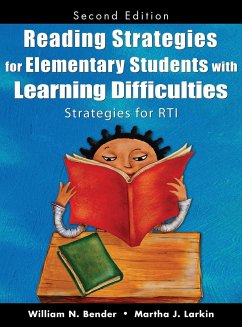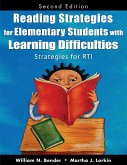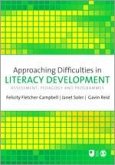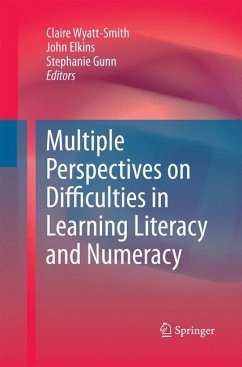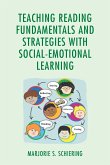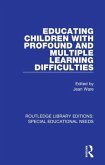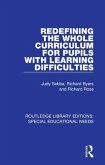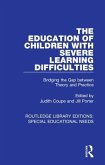William N. Bender, Martha J. Larkin
Reading Strategies for Elementary Students With Learning Difficulties
Strategies for RTI
William N. Bender, Martha J. Larkin
Reading Strategies for Elementary Students With Learning Difficulties
Strategies for RTI
- Gebundenes Buch
- Merkliste
- Auf die Merkliste
- Bewerten Bewerten
- Teilen
- Produkt teilen
- Produkterinnerung
- Produkterinnerung
Packed with research-based strategies for use with RTI, this resource covers brain-compatible reading instruction for students with learning disabilities or reading difficulties.
Andere Kunden interessierten sich auch für
![Reading Strategies for Elementary Students with Learning Difficulties Reading Strategies for Elementary Students with Learning Difficulties]() William N BenderReading Strategies for Elementary Students with Learning Difficulties46,99 €
William N BenderReading Strategies for Elementary Students with Learning Difficulties46,99 €![Approaching Difficulties in Literacy Development Approaching Difficulties in Literacy Development]() Approaching Difficulties in Literacy Development67,99 €
Approaching Difficulties in Literacy Development67,99 €![Multiple Perspectives on Difficulties in Learning Literacy and Numeracy Multiple Perspectives on Difficulties in Learning Literacy and Numeracy]() Multiple Perspectives on Difficulties in Learning Literacy and Numeracy110,99 €
Multiple Perspectives on Difficulties in Learning Literacy and Numeracy110,99 €![Teaching Reading Fundamentals and Strategies with Social-Emotional Learning Teaching Reading Fundamentals and Strategies with Social-Emotional Learning]() Teaching Reading Fundamentals and Strategies with Social-Emotional Learning42,99 €
Teaching Reading Fundamentals and Strategies with Social-Emotional Learning42,99 €![Educating Children with Profound and Multiple Learning Difficulties Educating Children with Profound and Multiple Learning Difficulties]() Educating Children with Profound and Multiple Learning Difficulties157,99 €
Educating Children with Profound and Multiple Learning Difficulties157,99 €![Redefining the Whole Curriculum for Pupils with Learning Difficulties Redefining the Whole Curriculum for Pupils with Learning Difficulties]() Judy SebbaRedefining the Whole Curriculum for Pupils with Learning Difficulties139,99 €
Judy SebbaRedefining the Whole Curriculum for Pupils with Learning Difficulties139,99 €![The Education of Children with Severe Learning Difficulties The Education of Children with Severe Learning Difficulties]() The Education of Children with Severe Learning Difficulties157,99 €
The Education of Children with Severe Learning Difficulties157,99 €-
-
-
Packed with research-based strategies for use with RTI, this resource covers brain-compatible reading instruction for students with learning disabilities or reading difficulties.
Hinweis: Dieser Artikel kann nur an eine deutsche Lieferadresse ausgeliefert werden.
Hinweis: Dieser Artikel kann nur an eine deutsche Lieferadresse ausgeliefert werden.
Produktdetails
- Produktdetails
- Verlag: Corwin
- 2. Auflage
- Seitenzahl: 272
- Erscheinungstermin: 12. Januar 2009
- Englisch
- Abmessung: 286mm x 221mm x 19mm
- Gewicht: 952g
- ISBN-13: 9781412960687
- ISBN-10: 1412960681
- Artikelnr.: 25435548
- Herstellerkennzeichnung
- Books on Demand GmbH
- In de Tarpen 42
- 22848 Norderstedt
- info@bod.de
- 040 53433511
- Verlag: Corwin
- 2. Auflage
- Seitenzahl: 272
- Erscheinungstermin: 12. Januar 2009
- Englisch
- Abmessung: 286mm x 221mm x 19mm
- Gewicht: 952g
- ISBN-13: 9781412960687
- ISBN-10: 1412960681
- Artikelnr.: 25435548
- Herstellerkennzeichnung
- Books on Demand GmbH
- In de Tarpen 42
- 22848 Norderstedt
- info@bod.de
- 040 53433511
William N. Bender, PhD, has had a long and distinguished career in education, teaching in public school for several years and in higher education for some 26 years at Blue?eld State College in West Virginia, Rutgers University in New Jersey, and the University of Georgia. He has written 36 books in special and general education. With his retirement, he has stepped back from his rigorous workshop schedule, which as recently as 2016 included some 40 workshop days per year. While the COVID-19 pandemic impacted his work, he has written four historical ?ction novels and several educational books in recent years. He has delivered several professional development projects, including most recently a keynote for a virtual conference on project-based learning in Brazil in conjunction with his Corwin book Project-Based Learning (2012). Learn more about William Bender¿s PD offerings Consulting Description: Differentiated Instruction Consulting Description: Math Consulting Description: Project-Based Learning Consulting Description: RTI Consulting Description: Technology
Acknowledgments About the Authors Introduction 1. The Reading Brain and Literacy Instruction The Good News in Reading Research! Big Ideas From Early Literacy Research The Emerging Emphasis on Literacy Assessments of Early Literacy Brain-Compatible Reading Instruction A Brain-Based Model of Reading What the Brain Research on Reading Has Found Conclusion What
s Next? 2. Phonemic Instruction: The Critical Emphasis in Reading and Literacy Phonological Instruction and Phonemic Instruction Phonemic Awareness or Phonemic Manipulation Guidelines for Phonemic Instruction Phonemic-Based Reading Programs Conclusion What
s Next? 3. Phonics and Word Attack Strategies Phonics and the Brain Phonics Instructional Options Strategies for Developmental Reading and Spelling Stages Conclusion What
s Next? 4. Strategies for Building Vocabulary and Reading Fluency Vocabulary and Reading Fluency Building Vocabulary The Importance of Vocabulary Development Do We Still Need Sight-Word Approaches for Vocabulary Instruction? How Good Readers Read Learning New Vocabulary Terms Word Recognition Instruction Deriving Meaning From Vocabulary Learning Strategies for Vocabulary Mastery Reading Fluency Conclusion What
s Next? 5. Gaining Meaning From Reading Reading Comprehension and the Brain Story Grammar Student Think-Alouds or Inferencing Substrategies Question Answering List Summaries Improvisational Drama Cooperative Discussion and Questioning (Coop-Dis-Q) Collaborating Strategic Reading (CSR) Bibliotherapy Conclusion What
s Next? 6. Reading Comprehension in the Content Areas Content Area Reading and the Brain KWPLS (Know, Want to Know, Predict, Learned, Summarize) Analogies Instruction Possible Sentences Vocabulary Self-Collection Strategy (VSS) Guided Reading in Textual Settings (GRITS) ReQuest: Asking Self-Declared Questions Idea Circles Infra-Act: Sharing Perspectives Question-Answer Relationships Conclusion Resources: Commercially Available Reading Programs Glossary Index
s Next? 2. Phonemic Instruction: The Critical Emphasis in Reading and Literacy Phonological Instruction and Phonemic Instruction Phonemic Awareness or Phonemic Manipulation Guidelines for Phonemic Instruction Phonemic-Based Reading Programs Conclusion What
s Next? 3. Phonics and Word Attack Strategies Phonics and the Brain Phonics Instructional Options Strategies for Developmental Reading and Spelling Stages Conclusion What
s Next? 4. Strategies for Building Vocabulary and Reading Fluency Vocabulary and Reading Fluency Building Vocabulary The Importance of Vocabulary Development Do We Still Need Sight-Word Approaches for Vocabulary Instruction? How Good Readers Read Learning New Vocabulary Terms Word Recognition Instruction Deriving Meaning From Vocabulary Learning Strategies for Vocabulary Mastery Reading Fluency Conclusion What
s Next? 5. Gaining Meaning From Reading Reading Comprehension and the Brain Story Grammar Student Think-Alouds or Inferencing Substrategies Question Answering List Summaries Improvisational Drama Cooperative Discussion and Questioning (Coop-Dis-Q) Collaborating Strategic Reading (CSR) Bibliotherapy Conclusion What
s Next? 6. Reading Comprehension in the Content Areas Content Area Reading and the Brain KWPLS (Know, Want to Know, Predict, Learned, Summarize) Analogies Instruction Possible Sentences Vocabulary Self-Collection Strategy (VSS) Guided Reading in Textual Settings (GRITS) ReQuest: Asking Self-Declared Questions Idea Circles Infra-Act: Sharing Perspectives Question-Answer Relationships Conclusion Resources: Commercially Available Reading Programs Glossary Index
Acknowledgments About the Authors Introduction 1. The Reading Brain and Literacy Instruction The Good News in Reading Research! Big Ideas From Early Literacy Research The Emerging Emphasis on Literacy Assessments of Early Literacy Brain-Compatible Reading Instruction A Brain-Based Model of Reading What the Brain Research on Reading Has Found Conclusion What
s Next? 2. Phonemic Instruction: The Critical Emphasis in Reading and Literacy Phonological Instruction and Phonemic Instruction Phonemic Awareness or Phonemic Manipulation Guidelines for Phonemic Instruction Phonemic-Based Reading Programs Conclusion What
s Next? 3. Phonics and Word Attack Strategies Phonics and the Brain Phonics Instructional Options Strategies for Developmental Reading and Spelling Stages Conclusion What
s Next? 4. Strategies for Building Vocabulary and Reading Fluency Vocabulary and Reading Fluency Building Vocabulary The Importance of Vocabulary Development Do We Still Need Sight-Word Approaches for Vocabulary Instruction? How Good Readers Read Learning New Vocabulary Terms Word Recognition Instruction Deriving Meaning From Vocabulary Learning Strategies for Vocabulary Mastery Reading Fluency Conclusion What
s Next? 5. Gaining Meaning From Reading Reading Comprehension and the Brain Story Grammar Student Think-Alouds or Inferencing Substrategies Question Answering List Summaries Improvisational Drama Cooperative Discussion and Questioning (Coop-Dis-Q) Collaborating Strategic Reading (CSR) Bibliotherapy Conclusion What
s Next? 6. Reading Comprehension in the Content Areas Content Area Reading and the Brain KWPLS (Know, Want to Know, Predict, Learned, Summarize) Analogies Instruction Possible Sentences Vocabulary Self-Collection Strategy (VSS) Guided Reading in Textual Settings (GRITS) ReQuest: Asking Self-Declared Questions Idea Circles Infra-Act: Sharing Perspectives Question-Answer Relationships Conclusion Resources: Commercially Available Reading Programs Glossary Index
s Next? 2. Phonemic Instruction: The Critical Emphasis in Reading and Literacy Phonological Instruction and Phonemic Instruction Phonemic Awareness or Phonemic Manipulation Guidelines for Phonemic Instruction Phonemic-Based Reading Programs Conclusion What
s Next? 3. Phonics and Word Attack Strategies Phonics and the Brain Phonics Instructional Options Strategies for Developmental Reading and Spelling Stages Conclusion What
s Next? 4. Strategies for Building Vocabulary and Reading Fluency Vocabulary and Reading Fluency Building Vocabulary The Importance of Vocabulary Development Do We Still Need Sight-Word Approaches for Vocabulary Instruction? How Good Readers Read Learning New Vocabulary Terms Word Recognition Instruction Deriving Meaning From Vocabulary Learning Strategies for Vocabulary Mastery Reading Fluency Conclusion What
s Next? 5. Gaining Meaning From Reading Reading Comprehension and the Brain Story Grammar Student Think-Alouds or Inferencing Substrategies Question Answering List Summaries Improvisational Drama Cooperative Discussion and Questioning (Coop-Dis-Q) Collaborating Strategic Reading (CSR) Bibliotherapy Conclusion What
s Next? 6. Reading Comprehension in the Content Areas Content Area Reading and the Brain KWPLS (Know, Want to Know, Predict, Learned, Summarize) Analogies Instruction Possible Sentences Vocabulary Self-Collection Strategy (VSS) Guided Reading in Textual Settings (GRITS) ReQuest: Asking Self-Declared Questions Idea Circles Infra-Act: Sharing Perspectives Question-Answer Relationships Conclusion Resources: Commercially Available Reading Programs Glossary Index

